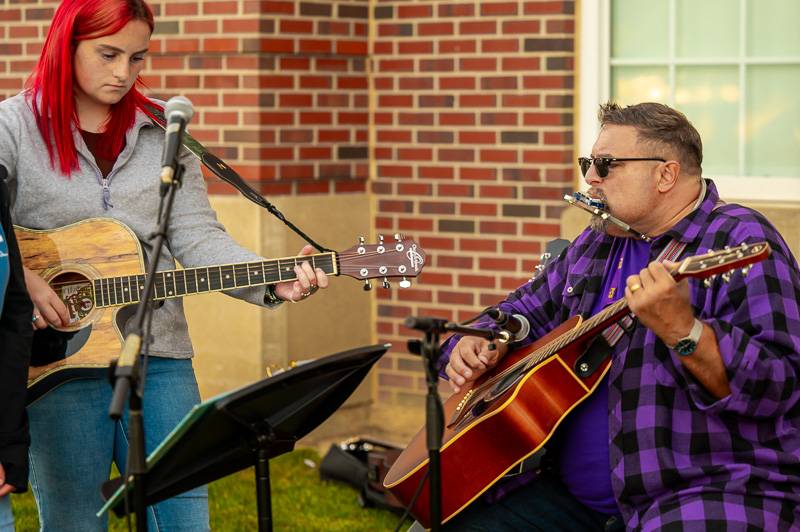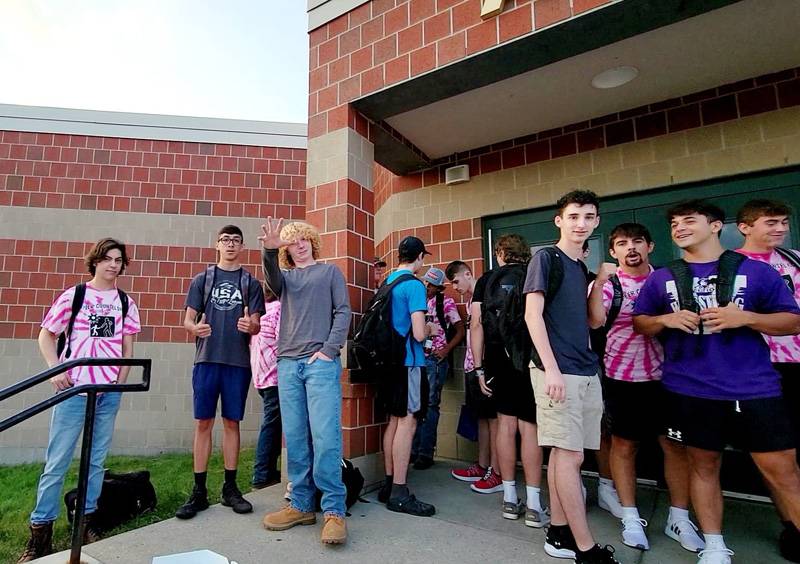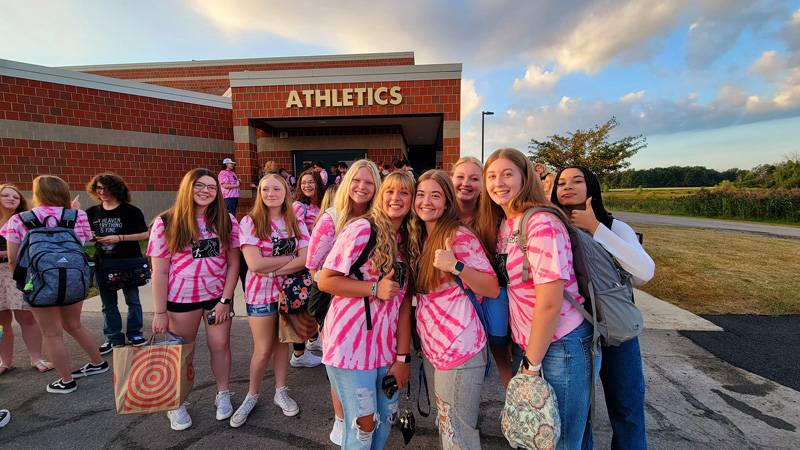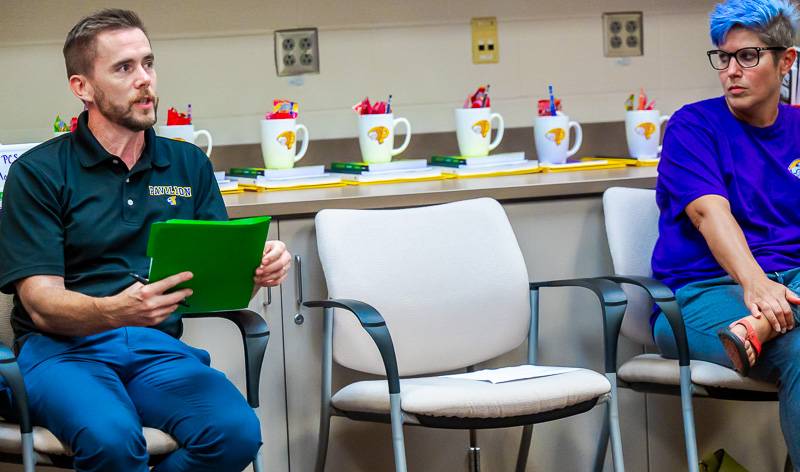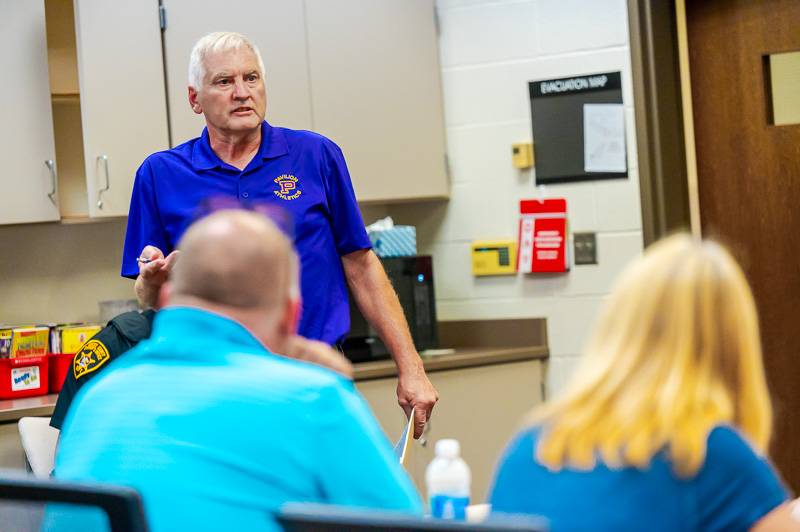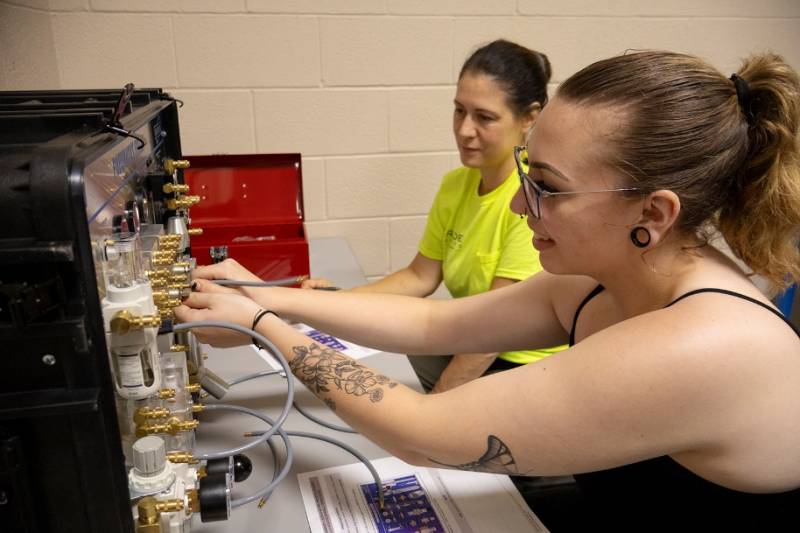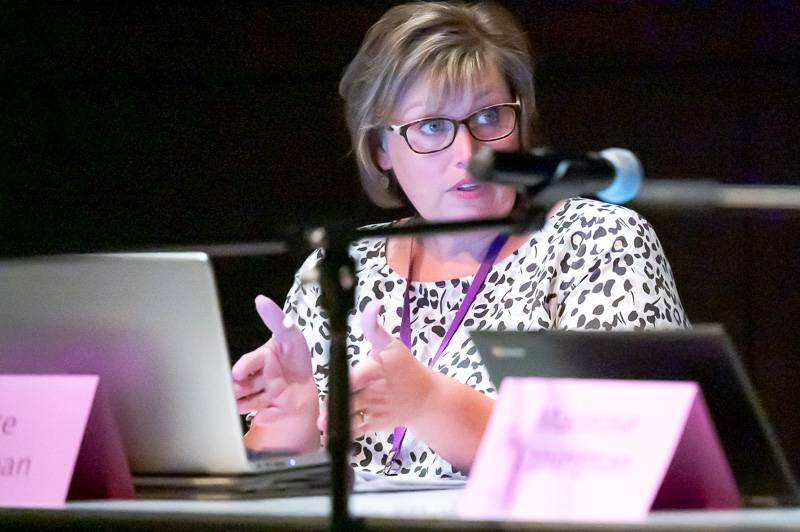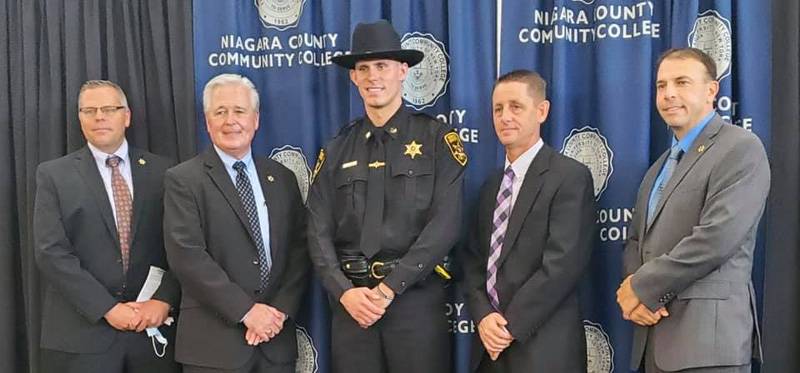Charge against Batavia mother for emails sent to school officials raises First Amendment concerns
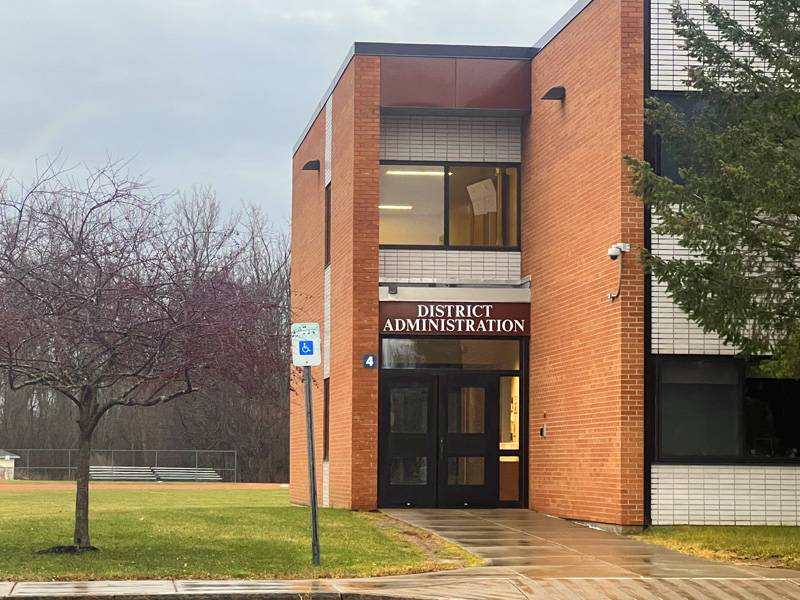
Photo by Howard Owens.
Free speech and the right to petition your government over grievances: two rights clearly protected in the United States by the First Amendment.
But when does complaining to government officials cross the line into harassment?
That's a high bar to cross, and should be, according to Constitutional scholar Jared Carter.
Carter is counsel with the Cornell Law School First Amendment Clinic, based in Ithaca, and a professor of Law at Vermont Law and Graduate School. Carter specializes in First Amendment cases.
Wherever that line is between protected speech and harassment, a Batavia mother who became upset in November with how her son's Spanish class at the Middle School was being taught didn't cross it, Carter told The Batavian after reviewing available documents.
The Batavian provided him with documents received from Batavia City Schools, which included emails sent by Kate Long to Superintendent Jason Smith, School Board Vice President John Reigle, along with other district officials, and the charging documents obtained from Batavia City Court.
The Charge
Long, 39, mother of three children, was issued a summons in November and charged with a single count of harassment in the second degree, a violation of Penal Law 240.26(3), which reads:
He or she engages in a course of conduct or repeatedly commits acts which alarm or seriously annoy such other person and which serve no legitimate purpose.
Carter said the language of the statute is too vague and overly broad to fairly apply to speech and is the same language that was once part of the state's aggravated harassment law, which was struck down by a federal court as unconstitutional in 2014.
The former aggravated harassment statute dealt specifically with spoken and written communication that was likely to "cause annoyance or alarm ... for no purpose of legitimate communication."
In People v. Golb, the court ruled that the former statute violated both the state Constitution and the Bill of Rights.
A similar case, People v. Dietze, struck down Section 240.25 dealing with language that was abusive or obscene with "the intent to harass, annoy, or alarm another person."
In the Golb case, the court held that both cases examined state statutes and said both failed to provide necessary limitations on the scope of communications that were criminally prosecuted.
"They're (prosecutors) skating on very thin constitutional ice, if any ice at all," Carter said of the arrest and prosecution of Long. "The First Amendment robustly protects Freedom of Speech, and the freedom to criticize government action. That would include criticizing the way that a school handles itself. Now, are some of her emails obnoxious? Perhaps. But the First Amendment very clearly, in my view, protects even obnoxious and, quite frankly, ugly speech, and unless speech fits into one of the very narrow few exemptions to the First Amendment, then it's going to be protected."
Carter said while we're talking about different statutes, they're essentially the same exact language that makes the harassment 2nd statute, when it involves prosecuting speech, is not likely to be found Constitutional if challenged.
Chain of Emails
The trail of events that led to Long's charge began in the middle of September when Batavia Middle School Principal Nate Korzelius informed parents that the teacher originally assigned to teach Spanish would be taking a long-term leave of absence. He said the district conducted a comprehensive search to find a certified Spanish substitute but was unable to find a qualified teacher to take over the class.
Instead, he said, "We will utilize an online program called AcceleratedU. This program has been thoroughly vetted and widely used by students nationwide, demonstrating its effectiveness in enhancing students' learning experience."
He invited parents to contact school officials with any problems or concerns.
A couple of weeks later, according to emails obtained from the district through a Freedom of Information Law request by The Batavian, Kate Long did express her concerns.
She said AcceleratedU was not a "long-term solution" for a sub.
"I think by now, you know this based on the grades of students," she wrote in an email to school officials on Nov. 1.
"The school needs to start looking for a long-term sub and put some actual effort into it," she wrote. "I'm getting pretty sick of spending every single evening being my son's unpaid Spanish teacher. Oh yeah, and I don't get a break on my taxes, either."
Superintendent Jason Smith responded the next morning and wrote, "We fully understand that there have been concerns with this, and despite our efforts to find a sub, including speaking with three retired teachers, networking across several counties for candidates, we literally had no one apply or who was even interested. There is, in fact, a severe shortage of Spanish teachers."
He also said the district had contacted the software company several times with complaints about the program, and while the company responded, "We know issues remain."
Long was not satisfied with the response and began a series of emails, often snarky, accusing district officials of not caring, of not doing enough, and of her role as an "unpaid" teacher.
She sent 16 emails over eight days. (The charging documents say 12 emails over eight days, but The Batavian counted 16 emails sent by Long in response to its FOIL request.)
Long, who studied Spanish in college and told district officials she lived for a year with a Spanish-speaking family, had specific complaints about grammatical errors she found in the program.
On Nov. 3, the board's vice president, John Reigle, responded and again reiterated the efforts undertaken by the district to hire a Spanish sub and noted that Smith had replied to her email the day before and invited her to meet with school officials.
That night, she wrote district officials and board members and said, "Hope you all are sleeping very nicely every night. I'm not. Look forward to more messages every single day that you lack to get a Spanish teacher."
She wrote individually to Reigle and said, "What a very eloquent way to say, 'I don't care.' Thanks a lot. That was sarcasm. Look forward to more emails until you DO SOMETHING."
In all, she sent 11 emails on Nov. 3 alone, concluding one that read, "I guess it would have been in my best interest to say, 'I don't care,' like all of you."
In his sworn complaint, Board President John Marucci quoted from Long's second-to-last email, sent on Nov. 8 at 9:37 p.m.
"Fuck you all. You are all jokes. You call yourselves educators. You reap what you sow.”
Marucci wrote, in his statement, that Long was complaining about online learning of Spanish in her emails but also stated that she sent "these emails with no legitimate meaning or purpose to the point that we as the City of Batavia School Board of Education feel like we're are being harassed by Kate Long by her alarming and annoying emails. I would like to pursue any and all legal charges against Kate Long."
Political Speech
Carter said Long's emails are political in nature, seeking correction to what she believes is a wrong perpetrated by a government body and is, therefore, protected speech.
"I think it's fair to say that is some of the most protected speech that there is," Carter said. "I'm not saying at some point, you can't have emails becoming harassment. But I think 16 emails over the course of eight days? I don't see how we've crossed that line. And I think courts are going to look at it very skeptically if she were indeed to be prosecuted."
The Batavian emailed several questions to District Attorney Kevin Finnell. We wanted to know if Batavia PD consulted with his office prior to the arrest of Long and if he had any Constitutional concerns about the case.
"Our office does not generally participate in the investigation of criminal matters," Finnell said. "While we remain available to consult with law enforcement during an investigation, my office did not offer any input or advice in this particular case. Even in cases where we do offer advice during an investigation, the choice of what offense(s) to charge is ultimately determined by law enforcement."
As for the Constitutional issue, Finnell said he and all of his ADAs are sworn to uphold the Constitution and are mindful of that in prosecuting every case.
In 2015, former District Attorney Lawrence Friedman, in response to the Golb ruling, sent a memo to local law enforcement warning the departments to no longer arrest people under the portion of the aggravated harassment law that was struck down. He did not raise concerns about the similar language contained in the harassment 2nd statute, and Finnell noted that there is, in fact, a difference between the statutes.
In the Dietz and Golb cases, Finnell said, the courts were reviewing statutes that dealt specifically with speech.
"The statute charged here is different in that it does not target pure speech but rather proscribes behavior," Finnell said. "It is a violation of Penal Law 240.26(3) to engage in a course of conduct or repeatedly commit acts which serve no legitimate purpose and which have the effect of alarming or seriously annoying the targeted individual. While that conduct could include speech, it is the act or conduct itself that constitutes a violation of law."
Carter said that calling Long's emails "conduct" bypasses the fact that she was engaging in speech, and no matter what other word you apply to it, whether you describe hitting the send button an email as "conduct," it's still speech.
"I don't think that's going to carry a lot of water," Carter said. "These are emails, and there's plenty of case law out there that talks about expressive conduct, which I don't even think this is, I mean, these are emails, this is communication, plain and simple. And I just don't think they're going to be able to convince a court, and quite frankly, the material that you sent that the district attorney shared, to my mind -- I just don't see this being prosecuted. I don't know how you could possibly criminalize 16 emails, even one that used a cuss word and be consistent with the First Amendment under a harassment statute, the bulk of which I think has been essentially struck down."
Cases that involve the Supreme Court upholding conduct as speech:
- Stromberg v. California, which, in 1931, protected as free speech, the right to display a red flag;
- United States v. O’Brien, which, in 1968, protected conduct that conveys a message in a case where a war protester burnt his draft card;
- Texas v. Johnson, in 1989, protected flag burning as political expression.
Profane speech, in Cohen v. California (1971), is also protected.
District Response
The Batavian also asked Superintendent Jason Smith and Board President John Marucci questions regarding the Constitutional issues raised by the case.
Both said they thought Long's emails crossed a line, and they turned to the police to help bring the communications to a halt. Smith said it is up to the justice system to decide whether Long's rights have been violated but that she was arrested within the scope of existing state law.
Marucci said he and the board respect the legal process and Constitutional rights but that they were facing an escalating concern and needed the assistance of the legal system, which will decide how best to deal with the case.
"Our decision was not about seeking charges against a citizen," Marucci said. "Instead, it was a necessary response to escalating inappropriate emails despite our attempts at dialogue. We value and address all respectful and constructive conversations with parents and community members. In this specific instance, it was essential for us to take a firm stance to protect our administration and staff from unnecessary harassment; we could not stand idly by, and therefore, we made the decisive choice to speak up and act in defense of our school community's well-being."
Smith said there are proper ways for residents to raise issues with the administration and school board, and the district respects the right of residents to disagree with their decisions. He doesn't believe, he said, that administrators and elected officials should necessarily be protected from annoying and upsetting speech but that this was an exceptional case. He said it is important to maintain a respectful and safe environment for everyone in the school community.
"While we fully support the right of individuals to ask questions and hold our school leadership accountable, this does not extend to the point of harassment or the use of inappropriate and inflammatory language," Smith said. "In this particular case, our decision to involve legal action was not taken lightly. It was a response to a pattern of communication from the parent in question that had escalated beyond acceptable norms of civil discourse. Our actions are in no way intended to infringe upon civil rights or to discourage constructive feedback and engagement from our community. Instead, they are a necessary step in protecting the well-being and safety of our school board members and staff and upholding a standard of respect and civility in our communications."
To read the full Q&A with both Smith and Marucci, click here.
Prior Restraint
Among the documents obtained by The Batavian from the school district is a letter from Smith to Long. It is dated Nov. 10 and informs Long that the matter has been referred to Batavia PD. It's the first time, at least in the communications obtained by The Batavian, that anybody with the district notified Long that officials found her emails annoying.
In it, Smith informs Long that her email address has been blocked, prohibiting her from communicating with any other district official except Smith, that she is not to contact any other district employee, and that she may not use the district's app, Parent Square, to contact staff members.
Carter said this letter is also Constitutionally problematic, though the case law on the matter is not settled.
"I could see a strong argument that blocking a member from the public from being able to send emails to government officials would have First Amendment implications," Carter said.
A case against former President Donald Trump regarding his practice of blocking people on Twitter never made it to the Supreme Court because he left office before the matter was settled. A lower court had previously ruled against Trump, saying he couldn't block people from using a public forum to criticize him.
There are two other cases pending before the Supreme Court regarding government officials and agencies blocking communication on social media platforms.
We couldn't find any cases dealing specifically with individual emails to the government or elected officials or using a government-run platform such as Parent Square.
The letter could potentially constitute "prior restraint." Courts have consistently held that the government cannot restrict speech and publication, regardless of any concern about future communication, that has not yet occurred.
It's this block to communication, along with Long's three children still attending school, that may be why her attorney, Tom Trbovich, from Buffalo, seems hesitant to fight a First Amendment case.
He said he would love to have a case he could take to the Supreme Court and win. It would help his career. But his first obligation is to his client and what is in the best interest of her and her family. He said while he's willing to do whatever his needed, it's also important to be realistic about the situation.
"As a secondary goal, I want to make sure that, you know, it'd be nice to make sure that relations and stuff like that with the families in the school workout, as well," Trbovich said after Long's initial court appearance, where she entered a not-guilty plea. "I want to make sure it's a win-win situation for everybody. And it's just going to take a little bit of time. I don't want to just do something quick in court. I want to do what's in the best interest of everybody."






